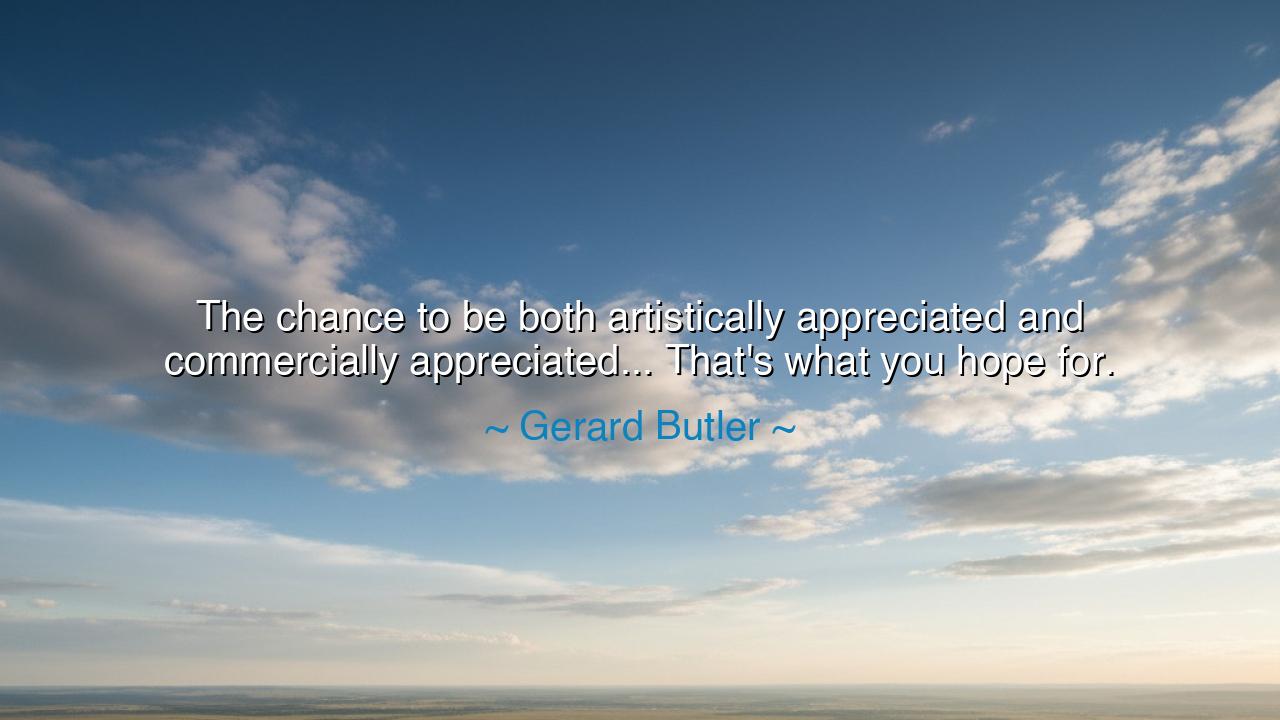
The chance to be both artistically appreciated and commercially
The chance to be both artistically appreciated and commercially appreciated... That's what you hope for.






In the journey of every artist, the path is not solely defined by the desire for recognition or fame, but by a deeper yearning—a yearning to be both artistically appreciated and commercially appreciated. As Gerard Butler wisely states, "The chance to be both artistically appreciated and commercially appreciated... That’s what you hope for." In these simple words, we find a powerful reflection on the dual struggle of every creator: the desire to create something authentic, something that speaks to the soul, while also wishing for the fruits of success that come from having that creation recognized and rewarded by society.
The ancients knew this tension well. Take, for instance, the great Greek playwrights such as Sophocles and Euripides, whose works resonated deeply with the masses, yet carried the weight of profound philosophical thought. They understood that the art of theatre was not merely to entertain, but to illuminate the human condition. Yet, in a world dominated by political figures and wealthy patrons, these playwrights also knew that the survival of their craft—and their legacy—depended on the commercial appreciation of their work. To be artistically true and yet commercially successful was a rare but cherished achievement, and they sought that balance with every play they wrote.
The Roman Empire provides another example, as Virgil, the poet who wrote the Aeneid, faced a similar challenge. Virgil’s work was both an artistic triumph and a piece of propaganda commissioned by Emperor Augustus to help unite the fractured empire. The poet sought to maintain his artistic integrity, while also fulfilling the expectations of the emperor, whose support ensured that Virgil’s epic would be read for centuries to come. Virgil’s success lay in his ability to combine the high ideals of art with the practical need for political and financial support, a balance that would shape his legacy in ways he could never have imagined.
Consider also the example of Leonardo da Vinci, whose genius was not confined to the brush, but stretched across the realms of engineering, anatomy, and architecture. His work was highly regarded by both his patrons and the intellectual circles of his time. Yet, while he received commissions from rulers and noble families, Leonardo’s inner conflict often lay in his desire to create for the sake of creation itself. He, too, sought the delicate balance of artistic freedom with the need for financial support, as he strived to work on projects that both challenged his creative abilities and secured his place in history.
The modern world offers us the story of artists such as Michael Jackson, whose blend of artistic innovation and commercial success reshaped the music industry. His albums were not only praised for their musical genius but also sold millions of copies worldwide, making him an icon of both artistic expression and commercial success. Jackson, much like Butler's ideal, achieved the rare feat of winning the respect of critics and the admiration of fans, forever cementing his place in history. But the challenges he faced, the balancing of artistic expression with public expectation, echo across the generations.
In our own time, we see Gerard Butler’s words as a reflection of the modern artist's struggle to reconcile the deeply personal with the public. The artist wants to create something that is true to their vision, something that will resonate deeply with the hearts of their audience, yet they also seek recognition, financial rewards, and the chance to live comfortably off their labor. In this tension, there is a call to remain authentic—to stay true to one’s craft—while also understanding the necessity of reaching the audience in a way that can make that vision sustainable.
The lesson we learn from Gerard Butler and the long line of artists throughout history is that the pursuit of both artistic and commercial appreciation is not merely a matter of chance but a matter of balance. To be artistically appreciated is to create something that speaks to the soul, that resonates with truth, but to be commercially appreciated is to ensure that one’s work survives in a world that often values profit and popularity over passion. It is in finding this balance, in walking the fine line between integrity and success, that we can leave our mark on the world, creating work that will not only endure but will be celebrated by both critics and the masses.
Thus, as we move forward in our own lives, let us remember the dual path that every creator must walk. Let us strive to stay true to our inner voice, to create with passion and purpose, while also understanding that recognition and reward can empower us to continue our work and share it with the world. May we, like the great artists of history, find the courage to pursue both artistic fulfillment and commercial success, knowing that in this pursuit, we not only honor our craft but also ensure that it reaches its fullest potential.






AAdministratorAdministrator
Welcome, honored guests. Please leave a comment, we will respond soon